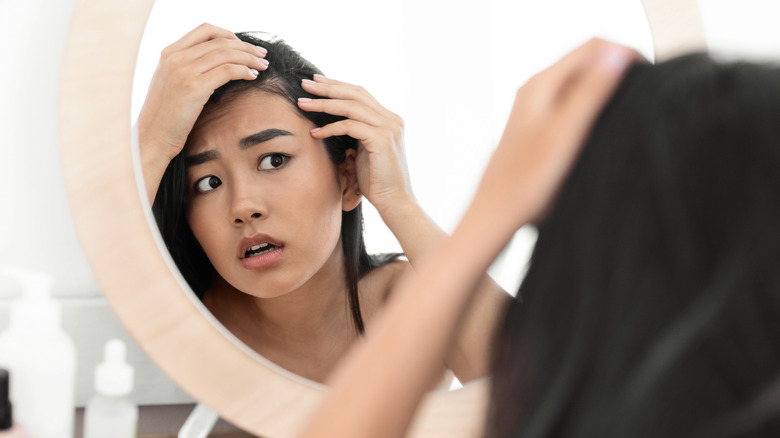Why You Might Deal With Hair Loss During MS Treatments
Although it might feel unsettling to see how much hair you lose after brushing or shampooing it, some hair shedding is actually a normal part of life. According to the American Academy of Dermatology Association, it's typical to shed anywhere from 50-100 strands of hair each day. That might sound like a lot, but since there are about 100,000 hair follicles on the entire head, 100 is a drop in the bucket (via Healthline). You might shed more than that if you have a nutritional deficiency, are excessively washing or heat-styling it, have a thyroid condition, or are experiencing higher levels of stress than usual. Sometimes, hair loss can also be associated with multiple sclerosis (MS). But it's not actually a symptom of the condition — instead, it's usually a side effect of MS treatments, according to Overcoming MS.
MS is an autoimmune condition that affects the nerves, damaging the fatty tissue that protects them (via Johns Hopkins Medicine). This nerve damage can cause a variety of symptoms, but generally, the first signs are difficulty walking, blurry vision, red-green color distortion, and numbness or a pins-and-needles feeling. It can also cause fatigue, muscle weakness, tremor, speech issues, and cognitive problems. MS is treated with various medications, and symptoms can be managed with rehabilitation activities and equipment like a walking cane.
How MS medication can impact your hair health
While hair loss is not a symptom of MS, some commonly prescribed MS medications may cause your hair to thin or fall out (per Overcoming MS). Immunosuppressant agents, for example, which are often prescribed to MS patients, frequently list hair loss as a side effect. Some of these drugs include azathioprine, methotrexate, cyclophosphamide, and mitoxantrone. Other MS medications that can cause your hair to thin include teriflunomide and beta-interferons, such as Avonex, Rebif, and Betaferon. If you're taking other medications, like antidepressants or blood pressure medications, they may also be contributing to your hair loss.
If you have MS and are experiencing hair loss, talk to your doctor about how you think your medication might be impacting you. Luckily, hair loss is usually temporary and will eventually stop, but you may need to find other ways to care for your hair health as well. Try focusing on eating a balanced diet that includes fatty acids and plenty of protein, gently massaging your scalp regularly, reducing stress through things like meditation or therapy, and getting your iron levels checked.


